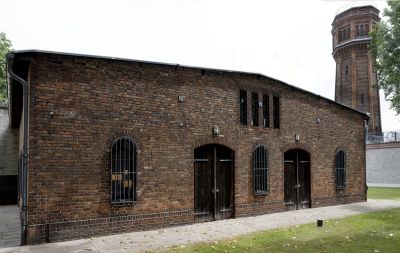TWO LIVES – ONE FATE: Irena Bobowska – Bronisława Czubakowska

Irena Bobowska’s name became known in Berlin thanks to Anna Krenz, an artist and political and environmental campaigner, initiator of the “Polonijna Rada Kobiet/International Council of Polish Women” and founder of the Dziewuchy Berlin (“Girls Berlin”) group.[7] Bobowska’s poem “As I learn...” (Polish: “Bo ja się uczę…”) was first recited in Berlin on 8 March 2021 in the German translation by Ewa Maria Slaska, as part of a performance by Dziewuchy Berlin at a demonstration to mark international women’s day. Her work was also read during commemorative events marking the end of the Second World War on 8 May 2021 and during the protest campaign on the International Day for the Elimination of Violence Against Women on 25 November 2021. Further projects focussing on Irena Bobowska and the culture of remembrance also include the translation of more of her poems into German, this time by a different female translator.
During the same year, Anna Krenz and Ewa Maria Slaska implemented a project funded by the Berlin Senate, “Irena Bobowska - Die vergessene Heldin” (“Irena Bobowska. The Forgotten Heroine”).[8] “In September 2022, four events will take place, including a debate about remembrance of Poles, particularly Polish women in Berlin, a performance that honours the life and death of Irena Bobowska, and an exhibition. The project will culminate in a publication, and the first steps will be taken to create a place of remembrance for Irena Bobowska. For this purpose, a commemorative plaque will be affixed to the prison wall in Alt Moabit and/or to a tree in Altglienicke cemetery”.[9]
“I accept. I do not feel guilty.”
- This was the answer given by Bronisława Czubakowska to the state prosecution official when he informed her that her beheading had been delayed by one day to 15 August 1942, 5:27 a.m.[10]
Bronisława Czubakowska was born on 9 July 1916 in the small town of Zgierz near Łódź. Her father was a labourer and her mother was a homemaker. She died when Bronisława was still very young. On 9 November 1939, Łódź, including the town and district of Zgierz, was annexed to the Recih District (“Reichsgau”) of Wartheland. After the German occupation of the region, a general requirement to provide forced labour was issued for the Polish population, although at first, the German employment offices only recruited volunteers to be sent to the Reich. However, in the late spring and early summer of 1940, harsher measures were applied to acquire cheaper (and in many cases, more subjugated) workers, including arbitrary arrests.[11] One of the victims of these “manhunts” was Bronisława Czubakowska, who was finally assigned to a fine jute thread spinning works in Brandenburg an der Havel, about 85 km from Berlin.
Aside from the German workforce, this factory employed 250 forced labourers from Poland, who produced thread for civilian customers, but also for the armament industry. The factory also had commercial connections to the concentration camps in the Third Reich and was thus a profiteer of the war.
[7] The Dziewuchy Berlin group, based in Berlin, has been working to promote women’s rights in Poland and Germany since 2016. It organises demonstrations, events, discussion panels and exhibitions, as well as historical projects that commemorate the lives of forgotten women in the Polish-German context and which are dedicated to a culture of remembrance. The group has received two honorary awards for its work: the feminist Green Pussyhat Prize (2018) and the Clara-Zetkin-Frauenpreis (2021).
[8] https://www.dziewuchyberlin.org/irena-bobowska-die-vergessene-heldin-zapomniana-bohaterka/?fbclid=IwAR1Lby_bTmiW0htlBpYK7XtO6FplchurNUIsp1C8W3tcRFHWSYEUpwhkqJw
[9] https://polkopedia.org/wiki/Irena_Bobowska (in Polish).
[10] Ein polnisches Menschenschicksal. Das Leben und Sterben von Bronisława Czubakowska aus Zgierz, exhibition catalogue (part of a German-Polish school project), dual-language: German/Polish, Potsdam 2006.
[11] On the working conditions suffered by Polish forced labourers, see my article (in German) “Meine Kinder aus Lodz”, in: Porta Polnica, June 2021, URL: https://www.porta-polonica.de/de/atlas-der-erinnerungsorte/meine-kinder-aus-lodz-moje-dzieci-z-lodzi














